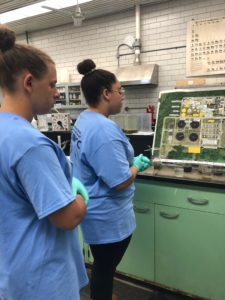As the United States’ wastewater workforce ages, the need for new operators entering the industry is becoming critical. In its document, “America’s Water Sector Workforce Initiative: A Call to Action,” the EPA Office of Water highlights the issue:
“One of the major challenges facing our nation is the critical and unprecedented staff shortage in the water workforce that operates and maintains our essential drinking water and wastewater infrastructure. In the next five to 10 years, water sector workers will be eligible to retire at levels that will stress our ability to operate this critical infrastructure. The clean and safe water and the way of life we have come to enjoy in this country cannot be sustained without our water protection specialists. We must address this pending shortage with focused engagement at all levels of government and our public and private water sector partners.”
According to EPA estimates, approximately one-third of all operators in the U.S. will be eligible for retirement in the next 10 years. As just one example, based on a 2020 review NEIWPCC conducted of our license records, 53% of all wastewater operators in Maine were over the age of 50, making them all eligible for retirement in 10 years or less. There is a significant need for new wastewater operators to fill the positions being vacated by these retirements.
Further exacerbating the impending workforce shortage is the fact that the wastewater industry is comprised almost entirely of men, many of whom ended up in their jobs through non-traditional paths. It is rare to find operators who actively chose and trained in advance for a career in wastewater, and fewer and fewer of these mechanically inclined professionals are entering the field.
Women currently make up only 4.5% of active licensed wastewater operators in New England and New York (NEIWPCC’s compact states). Increasing the percentage of women entering the wastewater industry is a logical way to help address the wastewater workforce shortage as a whole.
Although NEIWPCC has not historically collected demographic statistics for licensees, it is apparent that the workforce also lacks racial diversity. Focusing recruitment efforts on minority populations could lead to increased hiring and building of diversity in the industry.
One significant way to tackle these workforce development issues across the Northeast (and beyond) is by making wastewater a career of choice. NEIWPCC’s seasoned wastewater staff suggests this can be accomplished through focusing on four essential efforts:
- Outreach and Recruiting: Perhaps the most critical need for the wastewater workforce is an outreach and recruiting campaign to increase overall awareness of wastewater; and showcase wastewater as a rewarding career with good wages, benefits, and growth opportunity. Outreach and recruiting must also be targeted toward appropriate demographic and socioeconomic populations that have the greatest potential to become operators and will benefit the most from a career in wastewater.
- Education: Expand our existing operator training programs to ensure they are accessible and affordable for everyone, as well as offered in a wide variety of formats to meet the schedules and learning needs of everyone.
 Internship/Apprenticeship/ Mentorship Programs: Develop and implement internship, apprenticeship, and/or mentorship programs at wastewater facilities throughout the Northeast to provide essential hands-on experience to those new to the industry, as well as create networking relationships to provide the support needed to ensure candidates complete training, licensing, and employment goals.
Internship/Apprenticeship/ Mentorship Programs: Develop and implement internship, apprenticeship, and/or mentorship programs at wastewater facilities throughout the Northeast to provide essential hands-on experience to those new to the industry, as well as create networking relationships to provide the support needed to ensure candidates complete training, licensing, and employment goals.- Opportunity: Through networking and partnerships with a variety of job-assistance organizations, help connect interested candidates with employment opportunities. These organizations can assist candidates with resume writing, job-search tools, and interview preparation, among other skills.
Through active outreach and recruiting, and providing a clear and manageable path to education, licensing, experience, and long-term career opportunities, the industry can increase the number of operators entering wastewater. Targeting historically under-represented populations, such as minorities and women, can make a truly impactful difference for these people and the wastewater workforce as whole. This will ensure a sustainable and well-educated wastewater workforce well into the future, thereby perpetually protecting our nation’s waters.
This story was originally printed, with additional information, in the Fall 2021 issue of “Interstate Waters.” Written by Patricia L. Chesebrough, program manager in NEIWPCC’s Wastewater and Onsite Systems Division.